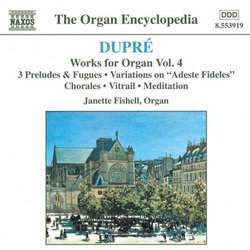| All Artists: Marcel Dupre, Janette Fishell Title: Dupré: Works for Organ, Vol. 4 Members Wishing: 0 Total Copies: 0 Label: Naxos Release Date: 12/1/1998 Genre: Classical Styles: Opera & Classical Vocal, Forms & Genres, Short Forms, Instruments, Keyboard, Symphonies Number of Discs: 1 SwapaCD Credits: 1 UPC: 730099491921 |
Search - Marcel Dupre, Janette Fishell :: Dupré: Works for Organ, Vol. 4
 | Marcel Dupre, Janette Fishell Dupré: Works for Organ, Vol. 4 Genre: Classical
|
Larger Image |
CD Details |
CD ReviewsOrgan Pyromania Daniel Mitterdorfer | Sydney, Australia | 09/07/2000 (5 out of 5 stars) "The Three Preludes and Fugues, in their time, were like no work ever written before. Composed as an entry in the prestigious Prix de Rome competition, they display astounding virtuosity, both in composition and in the performer. The B major Prelude and Fugue displays the typical qualities of a French toccata; dazzlingly quick handwork on the manuals with a profound, carillon-like melody in the pedals. The F minor Prelude and Fugue is far more subdued and vague about its statement, with much of it being played on Bourdons and Voix Celeste stops. The G minor Prelude and Fugue combines characteristics of both pieces proceeding it - the Prelude being soft and Presto, the Fugue being loud and Moderato. These pieces display a maturity well before their time, and if you analyse and dissect the pieces written around Op. 7, apart from his Quatre Motets Op. 9, you will not find anything as mature until his Variations in C# Op. 22 for piano, or his Symphonie-Passion, Op. 23 for organ.Variations on "Adeste Fideles" were originally an improvisation recorded on a Skinner Organ Company Pipe Organ roll, recorded at The Skinner Studio NYC in 1929. These rolls were very similar to those used by Grainger and Rachmaninov to record their own works. This improvisation was reconstructed and edited by the American Rollin Smith in 1974. The variations open with the hymn played on foundations, followed by a variation featuring the melody on Cromorne 8', accompanied by Flûtes 16', 8', 4'. An amazing triplet variation on Full Swell with Swell-Pedal follows, then a fugue in the relative minor (E). The piece is rounded off with a short typical French toccata of 3 pages in length. This piece makes a great concert piece at Christmastide and it isn't too difficult for the average organist to play, given an adequate instrument.Vitrail is Dupré's last composition with an opus number, and was composed to describe the stain-glass window at the cathedral of St Ouen in Rouen, where Dupré's father was organist. This piece is written from an artist's perspective, carefully detailing every object, no matter how small or insignificant, rounding off in an explicit coda of retrospective wonderment.Listeners continue to get a taste for the Seventy Nine Chorales, written as preliminaries for the counterparts in name, written by J.S. Bach. These are great pieces to start students off with and are his easiest works, next to some of his Inventions, Op. 50.Méditation, as the name states, is a quiet contemplation that was written for some friends as a contribution to their book 'A Library of Organ Music'.Paraphrase on the "Te Deum" was composed in 1946 and was possibly first performed as an improvisation at a recital at Notre-Dame de Paris. Jeanne Demessieux, a pupil and "acquaintance" noted in her diary on the day of performance, "Unforgettable - audience of about 6,500". As Dupré made his way down from the organ loft, fans, amazed at his playing, mobbed him. This reinforces Messiaen's own belief that Dupré was one of the 20th Century's finest composers and recitalists." Excellent performance on a great instrument marais | Boston, MA USA | 10/09/2006 (5 out of 5 stars) "As an addition to the review below, what makes this CD the best of the Dupre series on Naxos are the performer and the instrument. Jeanette Fishell, who is a nationally known organist and champion of the works of Petr Eben, shows herself a brillant interpreter of Dupre who has his technique down pat. Her performance is exquisitely well-thought, is well-registered and delivers quite an emotional impact. I dare you to find a better recording of the 3 Preludes and Fugues.
The organ at St George's Nashville is the 85-rank Casavant Op. 3606 from 1986, located high on the east end behind the high altar and speaking directly into the nave. It is notable for its rich assertive principal mixtures, an expressive Positif section with a wealth of solo voices, and 2 ranks of big trumpets (hooded ones in the Positif, and festival ones in the west end). Legend has it that a Casavant voicer from Quebec, on hearing the completed instrument, said that he was satisfied with the whole, "but the 2-footer, the 4-footer...she sing, she sing!" And it is a fact that the upper voices carry exceptionally well in this acoustic, and to great (sometimes fiery) effect in this recording. Casavant Op. 3606 has been featured on several recordings on CD and radio, but it has never sounded better than on this CD." |

 Track Listings (19) - Disc #1
Track Listings (19) - Disc #1